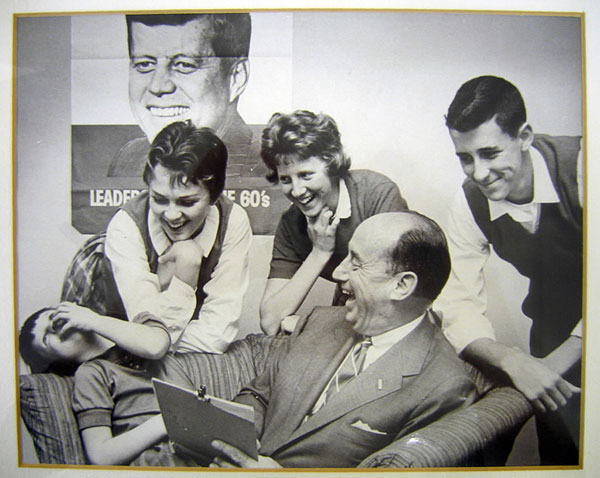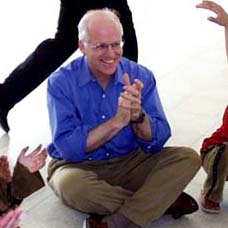
The two had begun dating in December 1963, when Jim invited Jessica to a gathering his parents were hosting for friends of their college-age kids at the Westside Businessman's Club. At the end of their junior year, Jessica flew out to surprise Jim over spring break. "We started talking," she said. "If we did intend to join the Peace Corps and be stationed together, we really would have to get married." They decided to both transfer to UW-Madison for their senior year. They would get married. Then join the Peace Corps. They figured the Peace Corps part would make it clear they were not love-struck kids on some kind of a lark. Telling Jim's parents wasn't bad. Ruth Doyle had a simple question - "How old are you?" - as a way of suggesting maybe they had not thought it through. But they had. At Jessica's house, it was different. Her father told Jim: "If you really loved my daughter, you'd stay at Stanford and get a Stanford degree and support her in an appropriate fashion." But he wouldn't go back. They were 20 and the future, their future, was in Madison. And then in Africa.
For Jim and Jessica Doyle, it crystalized around the Peace Corps, a program created by Kennedy
Jim Doyle: Seeds for race planted early
By GREG J. BOROWSKI
gborowski@journalsentinel.com
Posted: Oct. 7, 2006
Caption: Jim Doyle (right) grew up around politics and politicians. In this 1960 photo, his sister, Anne, sits on the lap of Adlai Stevenson as sisters Mary (standing left) and Catey look on. Photo: Edwin Stein/Courtesy of Doyle family
It was 1960, and Jim Doyle, then 14, was listening to a speech from the balcony of the Union Theater in Madison when a security official tapped him on the shoulder and asked him to step outside.
It was no ordinary request.
The speaker was John F. Kennedy, who then was running for president. The security guy was from the Secret Service. And Jim Doyle, well, he was the son of the leader of the movement to instead draft Adlai Stevenson as the Democratic nominee.
Jim looked at his father, who signaled it was OK to go along.
He was taken to a small room backstage where he could hear Kennedy speaking, could hear the muted cheers of the audience, could feel the twist of his own nerves. Finally, Kennedy walked in and sat down.
He knew the boy played baseball, shortstop. He called him "Jimmy," tousled his hair - hoping to make an impression on the father, though it was the boy who was smitten.
"My memory is we talked for hours," Doyle said. "Now that I've seen it from this perspective, we probably talked for 30 seconds or something."
Today, Jim Doyle is governor, holding a seat his father once sought. His victory in 2002, ending 16 years of Republican control, again stamped the family name on the Democratic Party, which his parents helped bring back to life after World War II.
To some, the conclusion may seem like a predictable one. But the road from there to here was anything but a straight line.
The family lived in a tight neighborhood on Madison's near west side, within throwing distance of a park.
"I was probably like most everyone else," Doyle said. "My life revolved around sports and school and church and friends."
Really, though, the family revolved around politics.
Jim Doyle, now 60, was born in Washington, D.C., where his father - Jim Doyle Sr. - was a rising star in politics.
The elder Doyle, son of an Oshkosh store owner, had graduated from the University of Wisconsin, excelled at Columbia Law School and, after a stint in the Navy, clerked for a Supreme Court justice and then went to work for President Franklin Delano Roosevelt.
His wife, Ruth, was part of the Bachhuber family, which for three generations had held seats in the state Legislature.
When the Doyles returned to Wisconsin in 1946, the Democratic Party existed mainly on paper. In state government, it was Republicans or Progressives.
Party revival
In a way, the modern Democratic Party would grow up along with young Jim, then less than 1 year old, in the Doyle home on Campbell St. It was there that the activists would gather, some with names now familiar from the state history books: Gaylord Nelson and Patrick Lucey, both future governors, among them.
Over drinks or dinner, they'd talk about who should run for what and how they could actually get elected. The children would listen, until comfortable enough to join the discussion.
At the time, there were three children, with Jim sandwiched between Mary and Catherine. Soon enough, there would be four: Another daughter, Anne.
In 1948, Ruth Doyle ran for the Assembly and won, one of the first women to ever be elected. So unexpected was the victory, her first words - according to family lore - were: "What am I going to tell my mother?"
Ruth Doyle, the kids remember, had the softer touch when it came to discipline. Jim Doyle Sr., tall and direct, could keep them in line with the simple arch of an eyebrow.
In 1954, it was his turn to run for office, governor. He was more comfortable with a prepared speech, always written out in longhand, than with all the hand-shaking and chitchat.
He traveled the state with Lucey, who functioned as the campaign manager, in a rambling Nash Ambassador.
"It was real hard for him to get out of the car and walk up to strangers," said Catey Doyle, the third of the four children. "They would just drive through some little towns."
She remembers one campaign trip to the State Fair, where her brother, Jim, begged to go on the roller coaster. He was a typical boy, as liable to be caught climbing the trellis as to write the name "Hank Aaron" over and over on a blue binder.
Her father relented and got sick on the ride.
"It was a disaster," she said.
Jim Doyle Sr. lost in the Democratic primary to William Proxmire, who went on to lose to Republican Walter Kohler, a two-term incumbent. Proxmire's future would be in the U.S. Senate.
And the senior Doyle, ultimately, would find himself on the federal bench, appointed by President Lyndon Johnson in 1965. The nomination might have come years earlier from Kennedy, had that visit with Jimmy Doyle done the trick.
After the speech that day, people kept stopping his father on the street to ask: How 'bout that Kennedy? Is he the one?
No, he'd say. Still Stevenson.
Jim Doyle Sr. would continue the draft-Stevenson movement, taking it all the way to the party convention in Los Angeles.
"I really thought, 'What's the matter with you?' " recalled his son. "We're Catholic. We're Irish. JFK seemed like the coolest guy I had ever seen in my life."
Making an impression
At the time, Doyle was a student at Madison West High School, where he seemed to be into everything. Basketball. Tennis. Student government.
The big man on campus.
"He was a sports star, everybody knew he was a brain, and his parents were famous," said Andy Cohn, who was several years behind Doyle.
"He was an easy-going, level guy," said John Norsetter, another friend. "There was never any sense of being in constant motion, but he always seemed to get things done."
Norsetter and Doyle were on the basketball team, where Doyle, a guard, was the unquestioned star. A broken arm sidelined him and - everyone is convinced - cost the team a berth in the state tournament.
The circle of friends included Jessica Laird, whose family had moved to Madison a few years earlier. Her father had attended UW with Jim's father, the two squaring off for student body president - an election that Doyle had won.
Jessica and Jim were friends. They would talk, trade stories, hang out. And, after graduation in 1963, they would go their separate ways: Jim to Stanford, Jessica to Northwestern.
That fall, the assassination of Kennedy hit both of them hard. Their whole generation, really. It reinforced a sense of purpose, of the need to do something.
For Doyle, that sense had been there for a long time. It came with the family name, with living in a house where Adlai Stevenson or Eleanor Roosevelt may be a dinner guest.
For Jim and Jessica, it crystalized around the Peace Corps, a program created by Kennedy.
The two had begun dating in December 1963, when Jim invited Jessica to a gathering his parents were hosting for friends of their college-age kids at the Westside Businessman's Club.
At the end of their junior year, Jessica flew out to surprise Jim over spring break.
"We started talking," she said. "If we did intend to join the Peace Corps and be stationed together, we really would have to get married."
They decided to both transfer to UW-Madison for their senior year. They would get married. Then join the Peace Corps.
They figured the Peace Corps part would make it clear they were not love-struck kids on some kind of a lark.
Telling Jim's parents wasn't bad. Ruth Doyle had a simple question - "How old are you?" - as a way of suggesting maybe they had not thought it through.
But they had.
At Jessica's house, it was different. Her father told Jim: "If you really loved my daughter, you'd stay at Stanford and get a Stanford degree and support her in an appropriate fashion."
But he wouldn't go back. They were 20 and the future, their future, was in Madison.
And then in Africa.
















